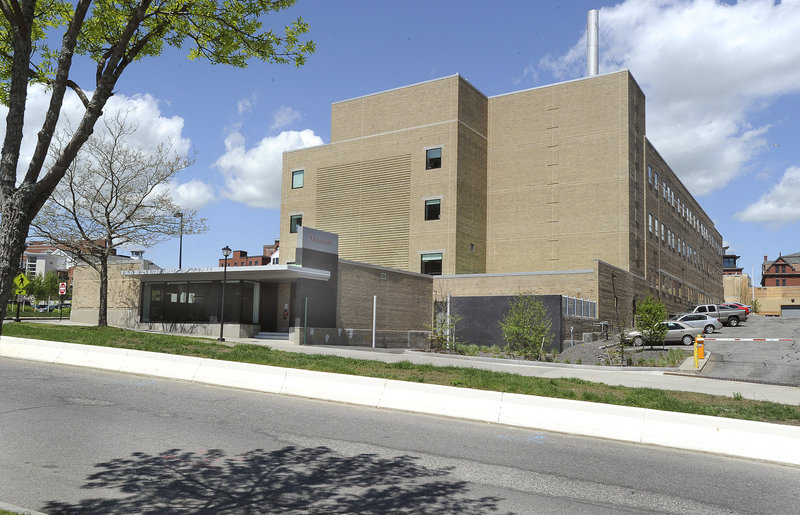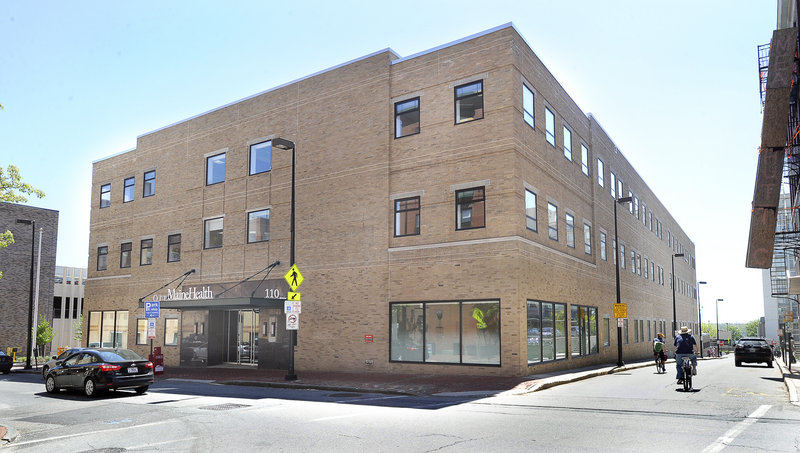PORTLAND – MaineHealth, the state’s largest health care network, is asking the city to waive part of the tax bill on its new corporate headquarters on Free Street.
While city officials have asked for more information before making a decision, MaineHealth’s request appears on the surface to fall within the state’s guidelines on tax exemptions for nonprofits.
That doesn’t mean city officials are happy with the prospect of removing more property from the tax rolls and potentially giving up $100,000 or more of annual tax revenue on the building that MaineHealth purchased in 2009.
“It’s terribly disappointing to me,” said City Councilor John Anton, chair of the council’s finance committee. “They’re well aware of the financial challenges we face as a city.”
Anton said he might be more sympathetic if the company was not so generous in other ways. MaineHealth’s CEO earned $1.2 million in total compensation in the 2008-09 fiscal year, while the city froze the salaries of its ambulance crews to help balance its budget, he said.
But MaineHealth is likely to see its request approved because it is a registered charitable nonprofit. To qualify as a nonprofit, an entity must reinvest its profits rather than pay them out to shareholders, and must provide public services.
MaineHealth provides a variety of services, including health campaigns aimed at childhood obesity, diabetes and asthma, programs to fight domestic abuse, school clinics and elder care, among others, according to the company. Also, MaineHealth requires its hospitals and physicians to care for people who have no insurance and no ability to pay, said Mark Harris, the company’s vice president of marketing and communications.
“That’s part of our responsibility to the community,” Harris said.
Under Maine law, charitable nonprofits are entitled to property tax exemptions, whether they are large multimillion-dollar hospitals and universities or small volunteer-run agencies.
Maine’s nonprofit hospitals have historically qualified for tax exemptions because they provide services that would otherwise fall to the public sector, said Jeff Austin, spokesman for the Maine Hospital Association. Other states created public hospitals to provide charity care to the poor, he said.
“(Maine hospitals) absolutely understand that the property tax exemption is a benefit, and part of the deal is to give back to their communities,” Austin said.
MaineHealth bought its new headquarters at 110 Free St. for $3.5 million and moved in last November after extensive renovations. The move allowed the company to consolidate operations from three different leased locations around the city.
MaineHealth’s annual tax bill at Free Street has been $119,000, according to the city. Officials expected the tax bill would increase to about $180,000 in the coming year because of the improvements.
The building also was declared tax-exempt years ago while serving as the headquarters for Blue Cross and Blue Shield. However, that nonprofit company made payments in lieu of taxes to the city ranging from $50,000 to $80,000 a year, officials said.
MaineHealth submitted its exemption application late last month. To qualify for a partial exemption, it has divided the building into distinct sections — profit and nonprofit — applying the same legal mechanism used to create property lines between condominiums.
If the application is approved, the company’s corporate offices and some other operations on the second and third floors would be tax-exempt. The first floor, which houses two health-related subsidiaries that are not charitable nonprofits, would continue to be taxable. It’s unclear how much tax revenue would be generated by the first floor alone.
Losing taxable properties has been a sore subject in Portland for many years. Nearly $1 billion of the city’s $7 billion tax base — about 13 percent — is now owned by private, tax-exempt organizations, including hospitals, colleges, schools, churches, museums and social service agencies, according to city data.
Anton, the city councilor, said he understands that MaineHealth provides charitable care and public services. But, he said, the company also relies heavily on city services, from publicly funded rescue crews to street plowing.
Anton was most critical of the request in light of the $1.2 million compensation package for MaineHealth Chief Executive Officer William Caron, the highest-paid health care executive in the state in the most recently filed annual reports.
“For them to say this (tax exemption) is supporting charitable work just doesn’t hold water with me. It’s just as much going to support the seven-figure compensation package of the chief executive,” he said. “They may be fully entitled to do this by law, but that tells me the law seems broken.”
Anton said he’s not sure that nonprofits necessarily need to pay the full tax rate, but the rules need to be tightened so tax burdens are shared fairly.
Portland and many other Maine communities have been trying to change the state’s tax exemption laws for years, but so far with little success.
Eric Conrad, spokesman for the Maine Municipal Association, said opposition from hospitals and others helped kill a recent legislative proposal to study the extent and impacts of tax exemptions in Maine.
“We just think it’s way past time to honestly examine what’s going on out there and see if there is another way to go,” Conrad said. “Whenever a nonprofit expands, they are taking property off the tax rolls … and all that does is really leave a greater burden for those homeowners and businesses who are paying their taxes.”
Staff Writer John Richardson can be contacted at 791-6324 or at:
jrichardson@pressherald.com
Copy the Story Link
Send questions/comments to the editors.




Success. Please wait for the page to reload. If the page does not reload within 5 seconds, please refresh the page.
Enter your email and password to access comments.
Hi, to comment on stories you must . This profile is in addition to your subscription and website login.
Already have a commenting profile? .
Invalid username/password.
Please check your email to confirm and complete your registration.
Only subscribers are eligible to post comments. Please subscribe or login first for digital access. Here’s why.
Use the form below to reset your password. When you've submitted your account email, we will send an email with a reset code.